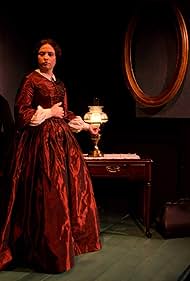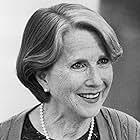Adicionar um enredo no seu idiomaJulie Harris performs her one-woman show based on the life of Charlotte Brontë.Julie Harris performs her one-woman show based on the life of Charlotte Brontë.Julie Harris performs her one-woman show based on the life of Charlotte Brontë.
- Direção
- Roteirista
- Artista
Fotos
Enredo
Avaliação em destaque
My review was written in November 1983 after a Lincoln Center screening.
"Bronte" is an engrossing and entertaining film of Julie Harris' one-woman show on the life of Charlotte Bronte. Handsomely filmed Sonny Fox production merits non-theatrical and tv exposure for discriminating audiences.
Adapted by playwright William Luce from his radio play "Currer Bell, Esq." (Charlotte Bronte's pen name), "Bronte" differs from most filmed or taped transcriptions of one-man shows in its realistic lensing on location, with Irish exterior and hose doubling convincingly for the Yorkshire setting. In this respect, the film has a precedent in Siobhan McKenna's 1971 "Here Are Ladies" (also filmed in Ireland). While McKenna's one-woman theater piece was augmented on film by supporting performances by the Abbey Theatre players, Julie Harris appears solo here, suggesting the presence of Charlotte's father, servants or visitors on screen by handing both ends of conversations.
Picture takes place in 1849, when Charlotte has returned home to her father from her sister Anne's funeral. Recalling old grudges and a hard life which has taken all her siblings ("I've struck back with 'Jane Eyre'", she notes regarding two sisters who died as children), Harris as Bronte uses props in the parsonage family home to jog her memory of earlier times. Marriage, "that obnoxious subject", is recalled as she wanders through an adjoining cemetery. Her father, Rev. Patrick Bronte, had opposed her getting married, and Charlotte reviews wistfully her unrequited near-affair with a married teacher in Brussels.
Artfully paced by Luce and director Delbert Mann, with moments of wit and light-hearted anecdotes balancing the serious mood, picture builds up a cumulative sense of loss as Bronte admonishes: "Don't knit human ties too closely, we must leave them someday". The colorful characters in her life: Aunt Branny, dissolute brother Branwell, sister Emily, fire & brimstone preacher William Grimshaw (her dad's predecessor in church) and others have passed on.
Using a slight but consistent accent, Harris gives an arresting performance, commanding attention with her voice rather than histrionics. She is ably abetted by Mann's subtle camera moves, natural-looking lighting through the house's windows and effective technical work by the Irish crew. Tinged with melancholy, this picture is a miniature treasure.
"Bronte" is an engrossing and entertaining film of Julie Harris' one-woman show on the life of Charlotte Bronte. Handsomely filmed Sonny Fox production merits non-theatrical and tv exposure for discriminating audiences.
Adapted by playwright William Luce from his radio play "Currer Bell, Esq." (Charlotte Bronte's pen name), "Bronte" differs from most filmed or taped transcriptions of one-man shows in its realistic lensing on location, with Irish exterior and hose doubling convincingly for the Yorkshire setting. In this respect, the film has a precedent in Siobhan McKenna's 1971 "Here Are Ladies" (also filmed in Ireland). While McKenna's one-woman theater piece was augmented on film by supporting performances by the Abbey Theatre players, Julie Harris appears solo here, suggesting the presence of Charlotte's father, servants or visitors on screen by handing both ends of conversations.
Picture takes place in 1849, when Charlotte has returned home to her father from her sister Anne's funeral. Recalling old grudges and a hard life which has taken all her siblings ("I've struck back with 'Jane Eyre'", she notes regarding two sisters who died as children), Harris as Bronte uses props in the parsonage family home to jog her memory of earlier times. Marriage, "that obnoxious subject", is recalled as she wanders through an adjoining cemetery. Her father, Rev. Patrick Bronte, had opposed her getting married, and Charlotte reviews wistfully her unrequited near-affair with a married teacher in Brussels.
Artfully paced by Luce and director Delbert Mann, with moments of wit and light-hearted anecdotes balancing the serious mood, picture builds up a cumulative sense of loss as Bronte admonishes: "Don't knit human ties too closely, we must leave them someday". The colorful characters in her life: Aunt Branny, dissolute brother Branwell, sister Emily, fire & brimstone preacher William Grimshaw (her dad's predecessor in church) and others have passed on.
Using a slight but consistent accent, Harris gives an arresting performance, commanding attention with her voice rather than histrionics. She is ably abetted by Mann's subtle camera moves, natural-looking lighting through the house's windows and effective technical work by the Irish crew. Tinged with melancholy, this picture is a miniature treasure.
- lor_
- 1 de fev. de 2023
- Link permanente
Principais escolhas
Faça login para avaliar e ver a lista de recomendações personalizadas
Detalhes
Contribua para esta página
Sugerir uma alteração ou adicionar conteúdo ausente


